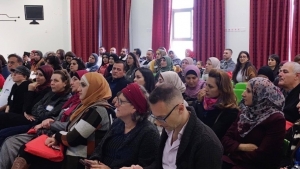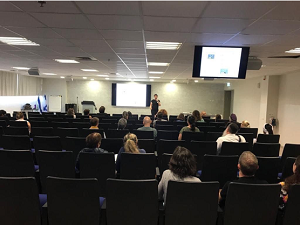|
English teaching associations have been facing numerous challenges in redefining their mission in the wake of the pandemic. This article focuses on the efforts of the English Teachers’ Association of Israel (ETAI) in re-establishing its activities while raising relevant questions for associations regardless of their geographical location.
ETAI is a grassroots, voluntary organization, which was established in 1979, and today is led by 14 National Executive Committee members. ETAI focuses on the professional development of English teachers who work in all sectors and at all levels of education – at the K-12 as well as at the tertiary level. A unique feature of ETAI is that it operates in a multi-lingual and multi-cultural context. ELT professionals from Christian, Druze, Cercessian, Muslim and Jewish backgrounds, from all over the country, comprise the body of our members. ETAI not only unites teachers cross-culturally, but also connects teachers who are the sole ELT educator at their school to a professional community to network and exchange ideas.
Maintaining membership has been a constant struggle for ETAI. The difficulty of engaging ELT professionals in ETAI was amplified during the pandemic, resulting in a decline in membership. The number of teachers of English in Israel is currently estimated to be 14,000 (Khawaja et.al. 2021), while the number of currently active members in ETAI ranges between 300-350. Even without an expertise in statistics, clearly the ratio of 350 to 14000 raises concern. Why don’t teachers want to become members of a professional organization? Is it a financial matter? ETAI’s yearly membership fee is 200 NIS – approx. $55 – a sum equivalent to the price of a bi-monthly cup of coffee for a year. Shouldn’t an educator want to invest in their own professional growth as much as they would in their coffee? Or should the question be: Are the days of paid membership over?
The second struggle concerns the post-pandemic re-establishment of face-to-face (F2F) events. ETAI’s raison d'être has always been its frontal events which enabled teachers at all levels and from all sectors of Israeli society to share ideas and develop together as ELT professionals. During the pandemic, we offered online events free of charge open to everyone with the rationale of wide exposure for ETAI. We had also hoped that after getting a taste of our events, teachers would desire more, thus increasing our membership. This desired effect has unfortunately not been realized. The post-pandemic return to the F2F format has been demanding. These days we are working very hard to re-establish ETAI events as mainly F2F. However, since people got used to getting professional development for free and have gone into ‘goblin mode’ (Knight, 2022), attendance at events has significantly dropped. Minimal attendance at F2F events following the pandemic is well illustrated by the pair of images provided below: pre-pandemic we had bustling scenes of conference attendees (Image 1), yet at our first major post-pandemic national event there was a dearth of attendees (Image 2).

ETAI Regional Mini Conference, Beit Hanina, February 2019

ETAI National Summer Conference, Tel Aviv 2022
In the past, in order to reach teachers in all corners of the country, and to provide more content for members, we held mini conferences a few times a year- such as the one in Image 1. We're finding it a struggle to reestablish that much activity and question whether it is actually necessary. We simply don't have the manpower nor the financial means to conduct such a great many activities.
Another struggle is getting academics and ESP teachers involved in ETAI. The main body of our membership consists of public-school teachers at the elementary, middle, and secondary school level while teachers at the tertiary level have the option of joining another organization focusing on ELT matters and serving professionals in higher education. While the two organizations serve different populations, at ETAI we believe that English language education can be viewed as one continuum from the initial steps of language learning through higher education; we would like to offer a platform to enable an interlevel dialogue. We also believe that our members could greatly benefit from learning about the research carried out at the academic level and its implications for language education. In addition, we believe that ETAI can serve as an umbrella organization for all ELT professional educators. We hope that our summer international conference will help with involving academics in the organization and bridge these gaps.
Despite these hardships, we have celebrated some triumphs. We started offering member-only webinars, which significantly increased membership. We had over 60 renewals and new members who wished to attend these events. These renewals have been especially imperative as ETAI employs one half-time administrator, vital for our survival, and this post is chiefly funded by membership fees.
Furthermore, as part of our close collaboration with the Ministry of Education, we facilitate members’ receiving in-service training credit for attending conferences, crucial for career advancement in the Israeli school system. We have designed a program through which teachers can accumulate 30 hours of professional development which is then recognized as accredited training time.
ETAI has demonstrated resilience in these arduous times and has been trying to adapt to meet our members’ needs, remain relevant in the face of constantly changing realities the pandemic brought about and we are determined to overcome these hardships. While we are facing many challenges, we certainly hope that our struggles will lead to continuing success.
References
Khawaja, A. J., Jakar, V. S., & Schvarcz, B. R. (2021). English as a mediator for communication and understanding: The case of Israel and Palestine. In Policy development in TESOL and multilingualism (pp. 217–230). Singapore: Springer.
Knight, L. (2022, December 22). ‘Goblin mode’: new Oxford word of the year speaks to the times. The Guardian. Retrieved April 5, 2023. From https://www.theguardian.com/science/2022/dec/05/goblin-mode-new-oxford-word-of-the-year
Bridget Schvarcz, PhD, is an associate professor, head of the English Unit at Afeka Tel Aviv Academic College of Engineering and a teacher educator for the Israeli Ministry of Education, Department of Professional Development. She currently serves as the Chair of ETAI. Her interests include formal semantics, teacher education and manifestations of language in areas of conflict. | 
